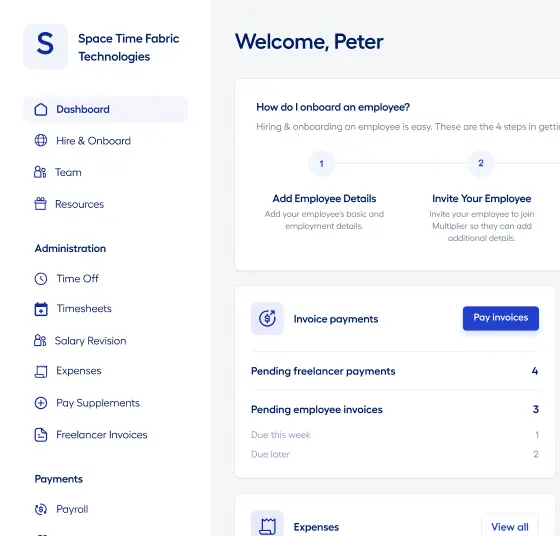When it comes to an expanding business and its work environment, job roles are usually dynamic. If you are hiring new staff for specialized tasks, you must understand how different titles – contractor vs. independent contractor vs. subcontractor – impact liability, insurance policy, workers’ compensation, and other aspects of your business.
Moreover, if you are starting your subcontracting company, it is crucial to understand the roles and responsibilities of an independent contractor vs. a subcontractor – while both are self-employed, the job descriptions vary.
We will break down the difference between a subcontractor and an independent contractor to make things easier.
Who is an Independent Contractor?
An independent contractor is a self-employed person, not classified as an employee but working under contractual terms for another individual or organization. Independent contractors agree to work on a project for a specific time, set their work hours and payment rates, and generally use their tools and equipment.
The IRS generally classifies lawyers, accountants, doctors, veterinarians, dentists, auctioneers, public stenographers, contractors, and subcontractors in an independent profession/trade/business offering services to other business entities as independent contractors. However, the catch is that a person is an independent contractor only if their services (how and what will be done) are free from any employer’s control and direction. In addition, the earnings of an independent contractor are subject to self-employment tax.
Who is a Subcontractor?
Like an independent contractor, a subcontractor is a self-employed person you pay for a short-term project but do not employ directly. However, there is a fundamental difference between a subcontractor and an independent contractor.
Instead of entering into a direct agreement with an individual or organization for a job, a subcontractor works for the person or entity contracted to the job (contractor). In other words, a subcontractor signs a contract to perform a specific part or parts of a contractor’s project.
Subcontractors are specialists with expertise in a particular field of work. It is mainly the independent contractors who hire subcontractors for a specific task. While a subcontractor decides their terms of work, their payment depends on the payment offered to the contractor. A subcontractor is a self-employed individual, and hence, they pay their taxes.
Definition of Contract Labor
The term contract labor covers people who do not meet the requirements of an independent contractor or subcontractor. They are neither full-time employees nor do they fulfill the criteria to be independent contractors.
However, people working under contract labor are included in the workers’ compensation policy like an employee would. So essentially, it includes anyone a company pays during a year via the IRS 1099 forms, uninsured subcontractors, and day laborers paid in cash.
Any company in the United States paying $600 or more for contract labor from an individual contractor must report the transactions to the IRS using Form 1099-MISC.
The IRS has strict guidelines for qualifying as a self-employed contractor or a “1099 employee.” For example, if a company has control over the financial elements of the contractor’s business or how they perform the job, they do not qualify for the “1099 employee” criteria. It also mandates that if a company offers benefits like health insurance and paid leaves to a professional, they are not 1099 employees.
What are the Liabilities of Contractors and Subcontractors?
While the definition of contractor and subcontractor indicates a significant difference between the two, the distinction becomes more pronounced when considering the employer and insurance liabilities.
First, let us compare the difference between contractor and subcontractor by discussing liabilities to their employer.
Contractors
An independent contractor is recruited for a time-bound project, working on a contractual basis instead of being the client’s full-time employee. They provide the labor, tools, equipment, and specialized services required to complete the project. Hence, the contractor is alone responsible for fulfilling the contract terms and is answerable to the client. So, even if the contractor hires someone else to do part of the work, the liability lies solely with them.
Subcontractors
The contractor may hire subcontractors to perform specific services or tasks requiring expertise in a particular area. For instance, a small business may hire an accountant to manage its finances, or an IT contractor may hire a technician for a project. Therefore, the subcontractor reports to the contractor, who, in turn, is accountable to the client. Hence, the subcontractor is liable to the contractor and not directly to the client. If any issues occur in the project, the client sues the contractor, who may then sue the subcontractor.
The Difference Between Contractor vs. Subcontractor Insurance
Another point to consider in the independent contractor vs. subcontractor discourse is how insurance policies work for the two. Whether you are working under a direct contractual agreement with a client or subcontracting the job, having the right insurance policies is crucial for protecting yourself and your company.
Below is a list of insurance policies you can consider if you hire subcontractors or work directly with clients.
Workers’ compensation insurance
A workers’ compensation insurance protects employers from the expenses of employee claims for workplace illness or injury. Typically, a worker’s compensation policy covers workplace accidents and injuries, death and related costs, lost wages, medical bills, and lawsuit costs.
Although state laws usually do not require self-employed contractors and subcontractors to carry workers’ compensation insurance, it may be a mandatory term of a client contract. However, state laws may require a workers’ compensation policy for licensed individuals, including contractors and subcontractors, for risky occupations. Moreover, a contractor or subcontractor can also purchase the policy to obtain coverage for work-related injuries.
Cyber liability insurance
Cyber liability insurance or cyber risk insurance covers businesses against property loss or liabilities caused by data breaches, hacking, viruses, ransomware, and denial-of-service attacks. Cyber liability insurance becomes paramount with the increasing and widespread adoption of digital technologies across organizations and the growing menace of cybercrimes.
There are broadly two types of cyber liability insurance options:
- First-party cyber liability insurance if you store personal information or client data on your servers
- Third-party cyber liability insurance if your work causes a data breach on the client’s servers and they sue you for it
In most cases, software developers, data scientists, or other contractors handling sensitive information must get third-party cyber liability insurance for protection against lawsuits.
General liability insurance
Commercial General Liability (CGL) or General Liability Insurance protects against unintentional third-party property damage or injury, including bodily harm to another person. While CGL is not a legal requirement in most cases, some states make the insurance mandatory for getting a license for specific contracting professions. Moreover, many clients want to see proof of insurance before entering into a business agreement with a contractor. If the contractor has no insurance and an accident occurs, it may fall on the client to pay for any damage. Likewise, if the subcontractor is uninsured, the contractor is liable to pay for any damage or injury caused by the subcontractor.
Surety bonds
A surety bond guarantees that the insurance company will reimburse the client if a contractor fails at a project completion or to fulfill a contract. So, when a client files a claim, the insurer directly pays the client instead of the contractor (the policyholder). Surety bonds are commonplace in high-value contracts. A significant difference between contractor and subcontractor is that only contractors need surety bonds, and the bond typically covers any subcontractor’s work.
E&O insurance
Errors and Omissions (E&O) Insurance or Professional Liability Insurance protects contractors from the cost of lawsuits claiming that their work was incomplete, late, or inaccurate. As with CGL, most clients may require contractors to carry E&O insurance before signing any contract to ensure they are not held accountable for their mistakes or negligence. On the other hand, E&O insurance protects contractors from lawsuits by dissatisfied clients. If you subcontract part of the work, it is wise to add your subcontractors to the E&O insurance policy since you are ultimately liable for their work.
Can a Contractor Add Subcontractors to Their Insurance Policy?
All subcontractors must have insurance with the same liability limits as you. If your subcontractor has their insurance coverage, verify their certificate of insurance and ensure that they have added you as an ‘Additional Insured’ on their insurance policy. It binds the subcontractor’s insurer to cover you if you are sued for the mistakes of your subcontractor.
However, many insurance policies do not include subcontractors in their liability coverage. If your subcontractor does not have their own insurance policy, you can give an additional premium and add them to your Commercial General Liability policy as ‘Additional Insured.’ You have to contact your insurer and ask to add the subcontractor as an additional insured. It will cover the subcontractor’s work for you but not what they do for other clients.
Benefits as a Subcontractor vs. Independent Contractor
While it is pretty clear that a subcontractor differs significantly from an independent or general contractor, each has its perks and benefits. In this section, we list some independent contractor vs. subcontractor benefits under the following heads:
Autonomy
Both contractors and subcontractors classify as self-employed and enjoy complete autonomy in deciding their terms of work with few obligations. They act in symbiosis, whereby contractors need subcontractors for the latter’s expertise and subcontractors need the contractors’ client network to land projects.
Licensing and insurance
While both contractors and subcontractors must have appropriate insurance and licenses, their licensing and insurance type differs. For instance, most independent contractors sign a surety bond before beginning a project, whereas the same does not apply to subcontractors. Since subcontracting involves more negotiation than bidding, subcontractors need not be bonded unless they are bidding on a project.
Payroll and taxes
The most significant benefit of being an independent contractor or subcontractor is that business owners hiring individuals on a contractual basis generally do not withhold or pay any taxes on behalf of contractors. However, contractors and subcontractors are responsible for paying self-employment and federal income taxes.
Conclusion
The independent contractor vs. subcontractor discussion highlights the fundamental differences between the two titles. However, if you find it confusing to navigate through the subtle nuances of these self-employed titles, you can partner with a global PEO-EOR firm like Multiplier.
Multiplier makes hiring independent contractors a hassle-free affair. Our SaaS-based PEO/EOR solution helps you build and manage remote teams globally and expand into newer markets. We can help you onboard contractors from a global talent pool and manage their payroll as well.
Connect with us and get to know how we can help you!
FAQs
Q. Do I have employee benefits as an independent contractor?
An independent contractor is self-employed and has no right to employee benefits. You are responsible for paying your own taxes (federal income tax and self-employment tax). If you obtain any additional benefits such as health insurance, you must pay for them.
Q. What are my benefits as an independent contractor?
Being an independent contractor has several advantages, including flexible working hours, freedom to choose projects, control over payment rates and work schedule, and no tax withholding from the government.
Q. Which occupations are best for an independent contractor?
Independent contractors can find work in almost any field with a high demand for one-off or project-based services. Contractor roles are commonplace in the construction industry, consulting and customer service, professional services like accounting and legal, IT support creative and design work, or any other skilled trade.







